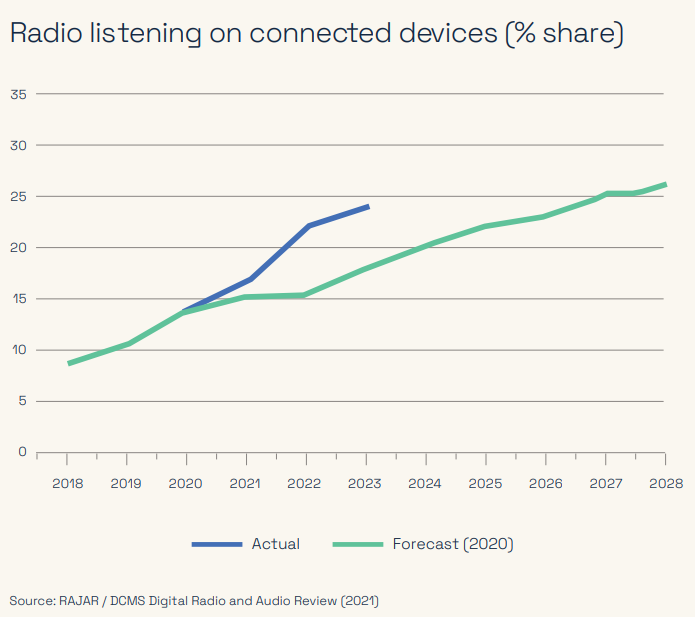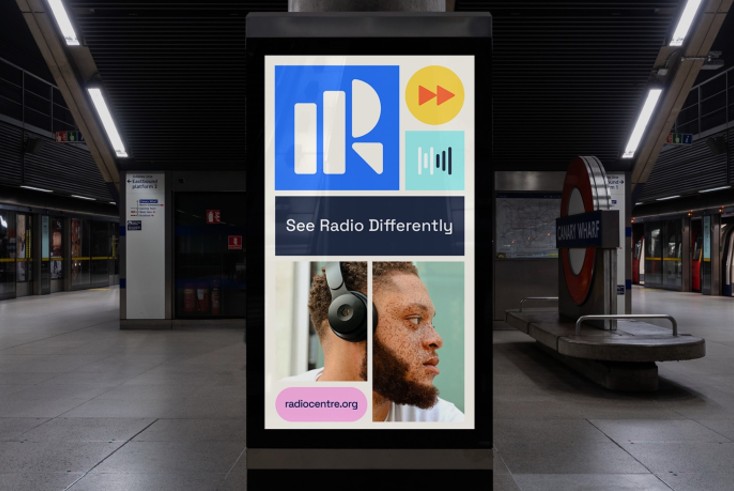To celebrate the 50th anniversary of the launch of commercial radio in the UK, commercial radio industry body Radiocentre is formally expanding its remit.
The body will now promote all forms of audio owned and operated by commercial radio broadcasters, including podcasts and on-demand streaming services.
The shift is an admittance of the need to address the rapidly evolving audio industry. In recent years, commercial radio has thrived and overtaken the BBC in terms of audience share; meanwhile, listeners increasingly tune in online via connected digital listening devices, be it on desktop, mobile or smart speaker.
‘The economics are in our favour’
Radiocentre CEO Matt Payton told The Media Leader the formalisation of its expanded remit is “probably a little overdue.”
“Broadcast is still fundamentally the biggest part of audio, but the bit that’s growing the fastest is the connected listening—whether that’s live radio streamed over connected devices, whether it’s podcasts, whether it’s music streaming—and increasingly our member companies are getting involved in that space,” said Payton, adding: “We’re clarifying that we are not just about linear radio anymore than our members are just about linear radio anymore.”

Commercial broadcasters’ expansion into digital is providing a boost to business, said Payton. He told The Media Leader broadcasters are able to generate higher CPMs on digital connected listening currently as compared to on broadcast, mostly due to the greater amounts of data they are able to collect on digital to better inform advertisers.
When compared to publishing’s challenges with moving to digital over the past 15 years, where outlets have been forced to trade more lucrative print ad revenues for the less profitable digital ad revenues, audio seeks to benefit from both linear and digital revenues.
“At the moment, the economics are in our favour,” Payton said. “Of course, in other areas of publishing, you’re stepping into a world of kind of unlimited inventory, because it’s online. But at the moment what broadcasters have been able to do is so far successfully leverage their success in linear audio into the digital space.”
Radiocentre CEO: we can’t just stand still and tell the same story
‘Securing the future’
The formalisation of Radiocentre’s expanded remit comes as part of a wider action plan, published today under the title ‘Commercial Radio: Stronger than Ever’. The action plan lays out five key recommendations to “secure the future” of the success of commercial radio.
Apart from expanding Radiocentre’s remit to reform commercial audio’s representation, these include: securing consumer access to UK radio online and on smart speakers, as well as updating regulation of local commercial radio news, through the forthcoming Media Bill; driving BBC “distinctiveness” by ensuring the BBC’s radio services “play a more complementary role” in providing listeners with distinct music output, as well as a focus on speech and local news and information; and reforming terms and conditions in radio ads.
The top short-term priority is ensuring the Draft Media Bill ultimately reflects the needs of the audio industry. The Media Leader reported last year that Boris Johnson’s government’s desire to push forward with privatising Channel 4 led to the UK’s radio sector being “left out in the cold” during consultations for the Broadcasting Whitepaper, a forerunner to the Media Bill.
However, the current Draft Bill makes more provisions to “level the playing field” between broadcasters and streaming giants, and amongst other elements, reduces regulation of commercial radio stations around content and format requirements from the 1980s.
Payton said he was “really pleased” that the Government has so far agreed to include sections on radio.
He explained: “It wasn’t a given until the last minute, so they listened to the evidence. The clauses as they’re written at the moment in the Draft Media Bill, I think are good. They don’t do everything [we want], but, overall, would they help secure radio’s position on voice assistants and smart speakers into the future? We think we think they would. So we are very supportive of the media bill as it stands.
“There’s a long way to go, but we think the Government’s been listening to the case that’s been made and so far has done the right thing.”
‘A landmark point’
Alongside the expanded remit, Radiocentre has been given a new visual identity. The brand refresh was designed by independent creative advertising company Fold7 and created to “reflect audio’s increasing digital capabilities”. The new identity includes a brand new logomark, typographic voice, colour approach and motion principles.

“We’re at a bit of a landmark point at the moment, because we’ve hit this 50 years golden anniversary, we’ve absolutely got the biggest audience we’ve ever had in terms of total numbers of listeners, we last year reported the highest revenue we’ve ever had in nominal terms,” said Payton. Commercial radio revenues were £740m in 2022.
“I think we’re having a bit of a moment. The golden age of audio and radio is here.”
Adwanted UK are the audio experts operating at the centre of audio trading, distribution and analytic processing. Contact us for
more information on J-ET, Audiotrack or our RAJAR data engine. To access our audio industry directory, visit
audioscape.info and to find your new job in audio visit
The Media Leader Jobs, a dedicated marketplace for media, advertising and adtech roles.






